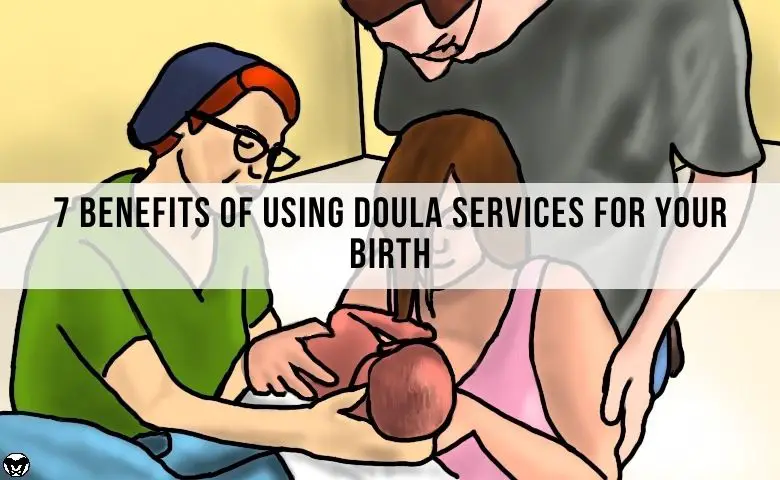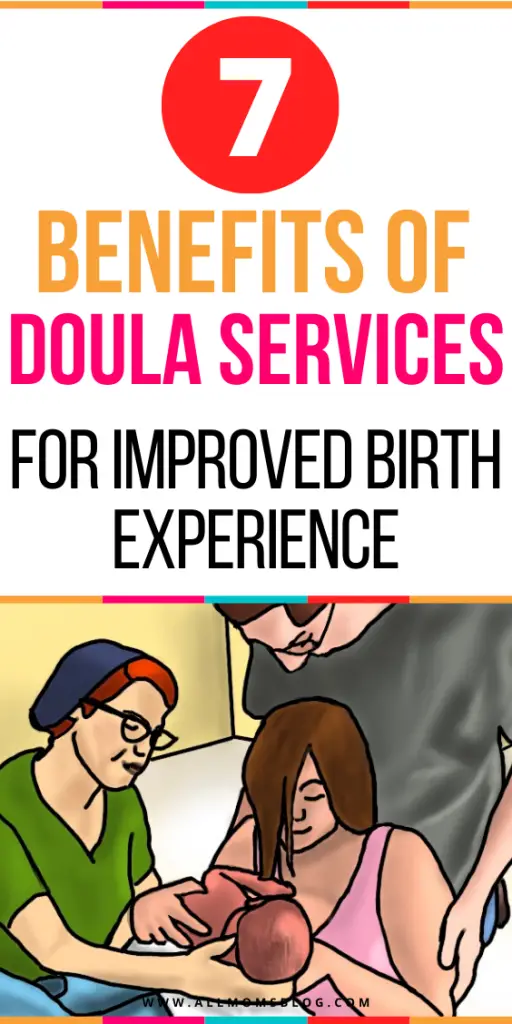What is a Birth Doula and what are the Benefits of using birth doula services?
Congratulations! You’re expecting a new baby or planning to try for one!
This is an exciting time and you likely have a lot of questions. Since you clicked on this article, I’m going to take a guess that you’re interested in using doula services for your birth.
You may be wondering what a doula is, how they can benefit you during labor, and what type of services they provide.

These are all valid questions. I had similar questions when I was pregnant with my first child.
I knew I wanted to birth without an epidural. I figured my best chance of meeting this goal was to have a good support system for my birth.
Since my husband and I live away from family, and friends have lives of their own, we decided to hire a doula.
Maybe you have similar concerns or maybe you’re just curious. So let’s dive in! I’ll fill you in on all the benefits to working with a doula.
I’ll also let you know about the amazing services they can provide and how to pick a good one!
Birth Doulas: The New, Old Trend in Birthing
The term “doula” was coined in the 1960s to describe a labor companion or friend. In actuality this labor role has ties back to Ancient Greece.
Doulas have become popular lately due to recent clinical studies. These studies have shown that the services doulas provide can benefit your birth experience in the following 7 ways.
7 Ways Doula Services Improve your Birth Experience:
- Doulas increase your chances of having a spontaneous vaginal delivery. You’re less likely to need assistance from Pitocin or other drugs to dilate your cervix or increase contractions.
- Doulas can help you to have shorter labors!
- They decrease your chances of needing an unplanned cesarean delivery.
- They decrease your likelihood of needing an assisted delivery such as an episiotomy, forceps, or vacuum.
- Doulas help to decrease your use of pain medications.
- Infants born to mothers who used doula services were found to have higher Apgar scores at 5-Minutes post-birth.
- Women supported by doulas were found to have more positive feelings about their birth than those who did not.
So, How do Doulas do all of this? Are they Magical or Something?

No doulas are people too, though I did find my doula to be quite magical. So magical in fact that she inspired me to become one too!
It’s their constant companionship and support that makes them special.
What Services Can a Doula Provide?
Basically, using doula services helps moms and babies to have healthier, happier birth experiences. Here are some services that a doula can provide you;
Doulas are there for you physically

During labor doulas assist the birthing person and their support people. Doulas are there for mom to help her cope with contractions but they are also there for dad, grandma, or whoever else is on your birth team.
Doulas can help you change positions, remind hubby to eat a sandwich, and they can even run blocker on any family or friends you really don’t want in your birth room.
Doulas do all of this so that the birthing mom can focus on her labor and not worry about anything else.
Doulas are there for you emotionally

One of the biggest support services that doulas provide is their constant companionship.
Unlike other care providers who may need to change shifts or attend to other clients, a doula is there for your whole birth experience.
You call your doula at any point during your labor. If you feel like you need extra support, that’s a good time to call.
Your doula stays with you from that point until you deliver or until they must take a break or risk providing poor care.
If your doula feels they can no longer give adequate support due to fatigue from a long labor, they will likely call for a back-up doula.
Doulas can provide a wealth of information during and prior to labor

Birth doulas can help you gather resources. They can help you to find evidenced-based articles about birth.
They can also offer suggestions on positions and techniques to try during labor to help labor progress.
Doulas help to amplify your voice when talking with care providers

When faced with tough medical decisions, a doula is there to offer a gentle reminder about your birth wishes.
For example, say a care provider recommended Pitocin to increase your contractions. Prior to labor you told your doula you really wanted to avoid using Pitocin because you were afraid of “pit pains.”
Since your doula is familiar with your birth plan, they know, you don’t want to use it and know you are struggling with what to do next.
They might say, “I know you don’t want to use Pitocin. Would you like to hear some other options?”
This prompts you to say, “Yes” or perhaps, “No.” If yes, then your provider is then prompted to talk about other options. If no, your doula should say, “okay.”
And respect your wishes.
Asking these types of questions helps to start a conversation with your provider that is more in-line with your wishes.
A doula should never speak for you to a care provider but they can help you to have a more productive conversation.
Services Doulas Don’t Provide!

- Doulas are not medical professionals.
- They cannot perform clinical tasks like vaginal exams or baby monitoring
- They should never give you medical advice or diagnose conditions.
- Doulas do not make medical decisions for you.
- Doulas do not take the place of your partner or other support people.
- They don’t catch the baby
What Type of Births do Doulas Support?

All types!
Some doulas do specialize their services to support certain types of deliveries but you can find a doula for whatever type of birth you decide to have.
Often, mothers who decide to have an epidural or a cesarean section find they need more emotional support. A doula can help to provide that.
Doulas are all about protecting your memory of birth. Whatever decisions you decide to make, it’s a doula’s goal to help you make them confidently so you can look back on your birth experience with pride.
What Type of Credentials do Doulas Have?
Technically, doulas need no training or certification to practice. I know it’s a bit crazy.
For this reason you do need to do your research and interview any doula you are considering working with.
Doulas often complete a training program with an organization and then go through a certification process.
Trained Doulas
Trained Doulas are capable of supporting you during labor. They often need to support a certain number of births and meet other requirements before they can become certified.
Hiring a trained doula often costs less than a certified doula. This may be a good option if the cost is a factor.
Certified Doulas
There are many different organizations that certify doulas. More well known ones include DONA International, CAPPA, and ICEA.
Doula Match has a great post about evaluating doula certification and provides a comprehensive list of certifying organizations. Check it out!
How Do I Find a Doula?
Doula Match is a great resource for finding doulas in the US. You may also be able to access a local network of doulas by doing a Google search or attending a birth expo.
Tips for Interviewing a Doula:
Child Birth Connection and Dona International both provide some great resources to help with interviewing a doula.
Child Birth Connection has a list of questions that you can ask your potential doula.
Dona International has a great article titled “How to Hire a Doula.” Be sure to check out the Parents’ Guide to Hiring a Doula at the bottom of the page.
How do you know a doula is right for you?
Go with your gut. If you feel a connection when you meet, they may be a good fit for you.
I remember feeling relaxed the first time I met my doula. She came to our house and her laidback personality was a good match for my husband and I.
Talking to her felt easy and comforting.
Bonus perk, my doula was a massage therapist. Boy did I appreciate her hands when I was in labor!
Side note: You don’t have to be a massage therapist to be helpful during labor. Many doulas do have additional training, licensing, or services that they offer. You can consider this when choosing who to hire.
Worried about Your Budget?

You can find a doula for any budget. Contact a local organization that certifies doulas and you may even be able to find a student doula that is willing to help you for free or low cost.
What should You Consider When Planning for Your Birth?
1. Choose your labor support people carefully.
Your labor and delivery is about you. It’s not about anyone else. The ultimate goal is to safely deliver your baby.
To do this, you need to support people who make you feel safe and comfortable. At least 2 and not many more is ideal for most women.
2. Write a Birth Plan

It doesn’t have to be complicated. A simple checklist is good. Consider writing one for a vaginal delivery and one for a cesarean delivery, just in case you need it.
Check out the guide from Pregnancy, Childbirth and the Newborn if you need help writing your birth plan.
A doula can also help you to write this if you choose to work with one.
3. Manage your Expectations
Reading birth stories from other women is a great way to get a better idea of what can happen during birth. It’s different for everyone but you can still learn a lot. Check out my collection of stories or search for more online.
Good Childbirth Education is critical to preparing for birth. Learning coping techniques and what to expect during each stage of labor will help you to make decisions calmly. Check out my article on coping with early labor.
Final Thoughts on Choosing to Use Doula Services
Working with a doula can be a wonderful experience. Just be sure to do your research and hire one that feels like a good match for you and your support team.
The most important thing that doulas provide is constant companionship. Whoever you choose to be present during your labor should make you feel comfortable and relaxed. Their attention should be on you.
Having someone who knows you really well, like a partner, family member, or close friend is ideal.
It also helps to have someone who is able to keep a clear head and focus only on mom.
Partners and close family or friends may have a hard time doing this because they are incredibly emotionally invested in the wellbeing of you and your baby.
If you have a friend or family member who you feel can fill this role, hiring a doula may not be necessary. If you can find a good one though, boy! It is AH-mazing!
Related Articles:
Gentle Cesarean: How To Have A Gentle Birth
29 Best Postpartum Essentials For Moms For Quick Recovery
17 Surprising Postpartum Body Changes No One Tells You
20 Best New Mom Products On Amazon You Need
9 Reasons To Consider Giving Birth At Home
Don’t Forget To Pin It For Later!


Really helpful advice! I’m not yet pregnant, nor trying, but having & getting a doula is definitely something I want to do for when the time comes. That & a mid-wife!
-Madi xo | http://www.everydaywithmadirae.com
Hi, Madi! Natural delivery is what I prefer the most and having a facility to give birth at home with a doula is something that has lots of benefits.